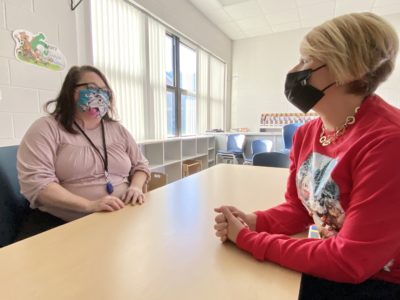

The following is part of my monthly column, One Day and One Goal: Expanding opportunity in N.C. I invite you to follow along as I share stories from classrooms and explore critical issues facing education in our state. Go here for past columns.
I know firsthand how meaningful mentorship can be in a person’s leadership development. I have shared in these columns that I would not be the person I am today were it not for the investment of my parents, my early educators, and various professional supports; and there are many more personal mentors I hope to give space and thanks to in these columns.
Reflections based on my own journey — as well as the journeys of people I’ve been privileged to meet through our One Day Breakfasts series — have led me to believe even more deeply in the power of our state’s coalition of educators who continue fighting to improve the life trajectory of every student in their care.
It is a power that is often taken for granted, which is why I want to pause and acknowledge the myriad roads that lead teachers into this field and the bonds that hold educators together on the frontlines of educational inequity.
How to foster education’s force multipliers
We prepare educators to enter K-12 classrooms with a skillset that may or may not fully equip them to meet the expectations of our education system.
Built on the assumption that every teacher who steps to the front of the classroom will have a positive and immediate multiplier effect, the formula boils down to one teacher for every twenty, thirty, fifty or more students, multiplied and averaged to measure the effectiveness of both the instruction and learning. The impetus then goes toward installing a force of quality educators that will execute this formula with results that affirm the system is working.
This results in a number of different outcomes — as well as side effects — including the alarming trends in teacher burnout and student chronic absenteeism.
Rewriting the expectations we’ve set for educators and students in this system of learning will take time; but even as we work towards change, we must also acknowledge the work that our current teaching force is putting in, day in and day out, to ensure that students can thrive.
In light of Teacher Appreciation Week, I propose that we begin to envision teachers as not only capable of a multiplier effect, but also as force multipliers when given individualized coaching and development.
Like the “multiplier effect,” “force multiplier” is a term that originated outside of the field of education. We borrow it to describe a capability or resource that, when added to the current force applied, increases the power and potential for success of the overall mission. When we think of educator potential this way, we come to think of them as leaders and pinch hitters for nearly any aspect of systems change.
Simply put, place that person in a position of influence — in front of a classroom, on a school board, or in a school leadership position — and the impact will be exponential.
Teach For America’s model of leadership is rooted in a belief that developing force multipliers is possible — and necessary — through a series of learning experiences.
First is the understanding that brilliance is distributed equally amongst all students, yet opportunity is not; and simply upon the circumstance of race, class, and/or geography, students face inordinate challenges in their educational and professional pursuits.
The next is a lifelong commitment to disrupting that reality, beginning with a two-year commitment to teaching in a low-income community, and so experiencing firsthand the brilliance of all students and the individual-level impact of systemic inequities.
As classroom leaders, Teach For America (TFA) corps members receive one-to-one development from a teacher coach who offers pedagogical and culturally responsive support during the particularly steep learning curve every new teacher faces. Often, these relationships are a critical indicator of the level of success corps members will have transitioning into their role. Another is having affirming relationships with fellow educators, including those in and beyond the TFA network.
The learning experiences TFA commits to our alumni after their two-year commitment in order to drive outsized student and systems impact is what sets our program apart. In fact, roughly 85% of TFA alumni remain in the education sector and proximate fields. The breadth of program partnerships accessible to alumni is a draw for those teachers who wish to pursue development opportunities such as further accreditation in school leadership — that is, teachers like Deon Smith.
Lifting teachers up, listening to their leadership
Deon was a physical education teacher in his second year at Vance County Middle School (VCMS) before learning about TFA. VCMS Assistant Principal Dr. Lemondré Watson had joined TFA in 2013, and in the course of his informal mentorship of Deon, encouraged him to consider applying for the corps.
“It’s been a blessing,” says Deon. “I told [Dr. Watson] I wanted to go back to school for my master’s. I enjoy being in the gym with the kids, but I want to move up into a position where I can do even more.”
Now, he’s wrapping up his corps commitment and looking into graduate programs, taking advice not only from Dr. Watson, who has since gone on to lead a nearby elementary school, but also fellow VCMS P.E. teacher Gloria Holden, who has over 20 years of experience and a master’s to boot. He’s also advised by Heddie Alston Somerville, who was Deon’s principal when he was an elementary student and has been mentoring him since he was hired as an educator under her leadership.
That doesn’t mean Dr. Watson’s place has been eclipsed in Deon’s life.
“He’s still someone I can talk to,” Deon says. “He was one of the first people I told when our twin girls were born a few months ago.”
Deon was a fully accredited — and by all accounts successful — educator before joining TFA. Yet the addition of a like-minded network of educators and the engaged mentorship of an alumnus has activated a new set of skills and connections that have made all the difference in his professional journey.
We cannot expect any leader in education to rise to the level our system demands without putting our time and resources on the line. If we want to fulfill the promise we make to every student who enters our classrooms, it will have to be by frontloading our teacher recruitment processes with the understanding that substantial investment must be sown into every educator who steps up, as well as honoring the exponential impact of the force multipliers we develop along the way. The future our students deserve will be realized by nothing less.




